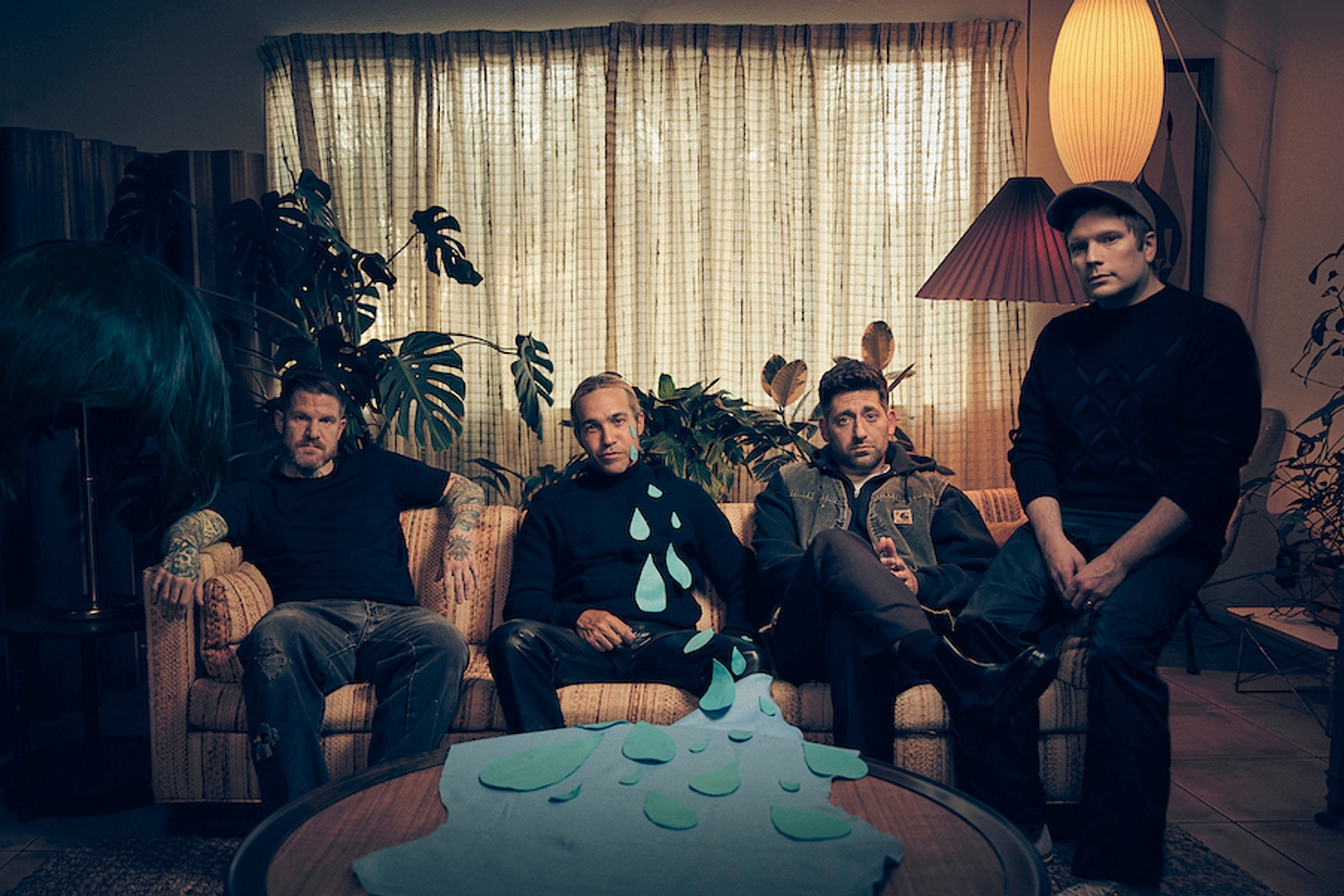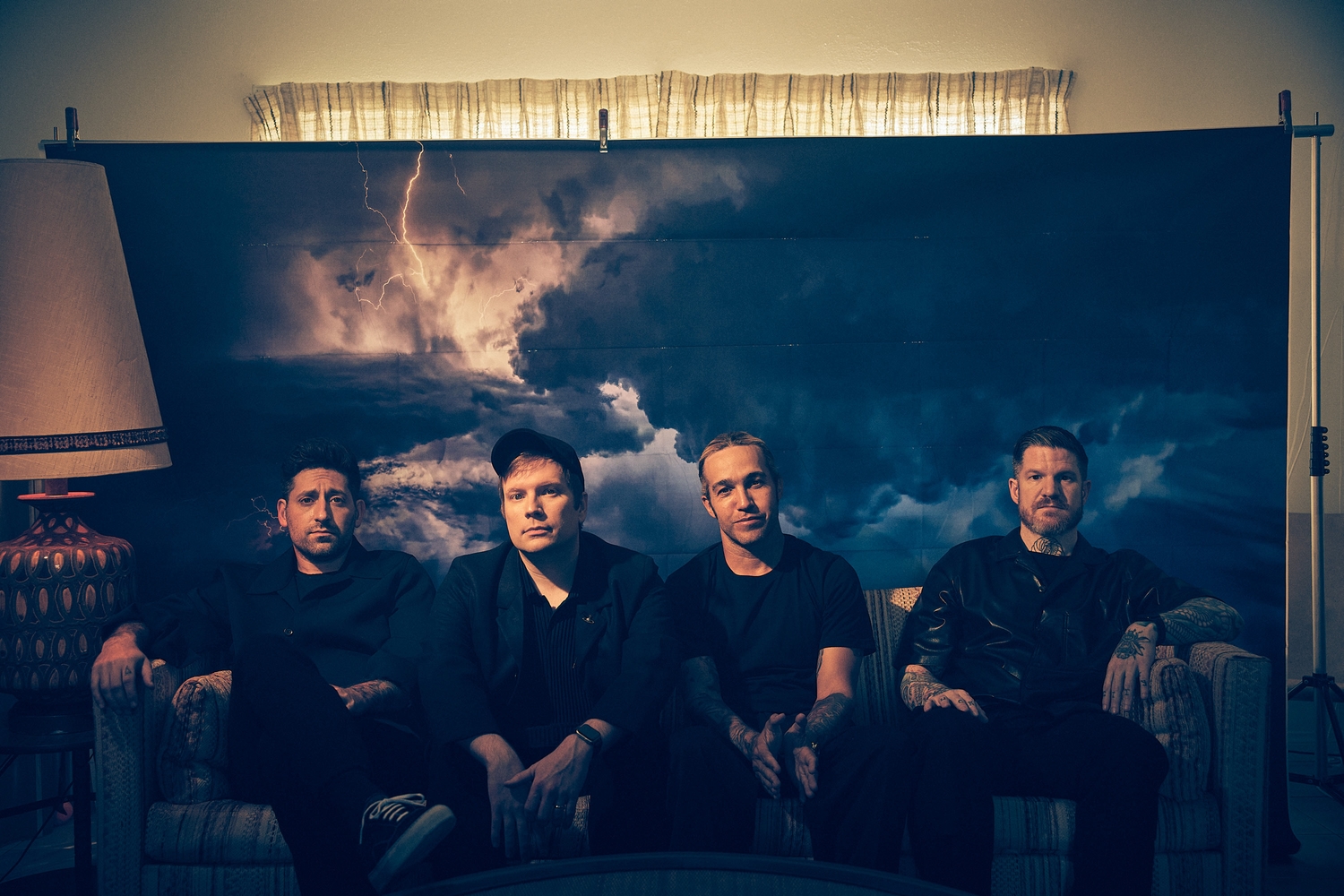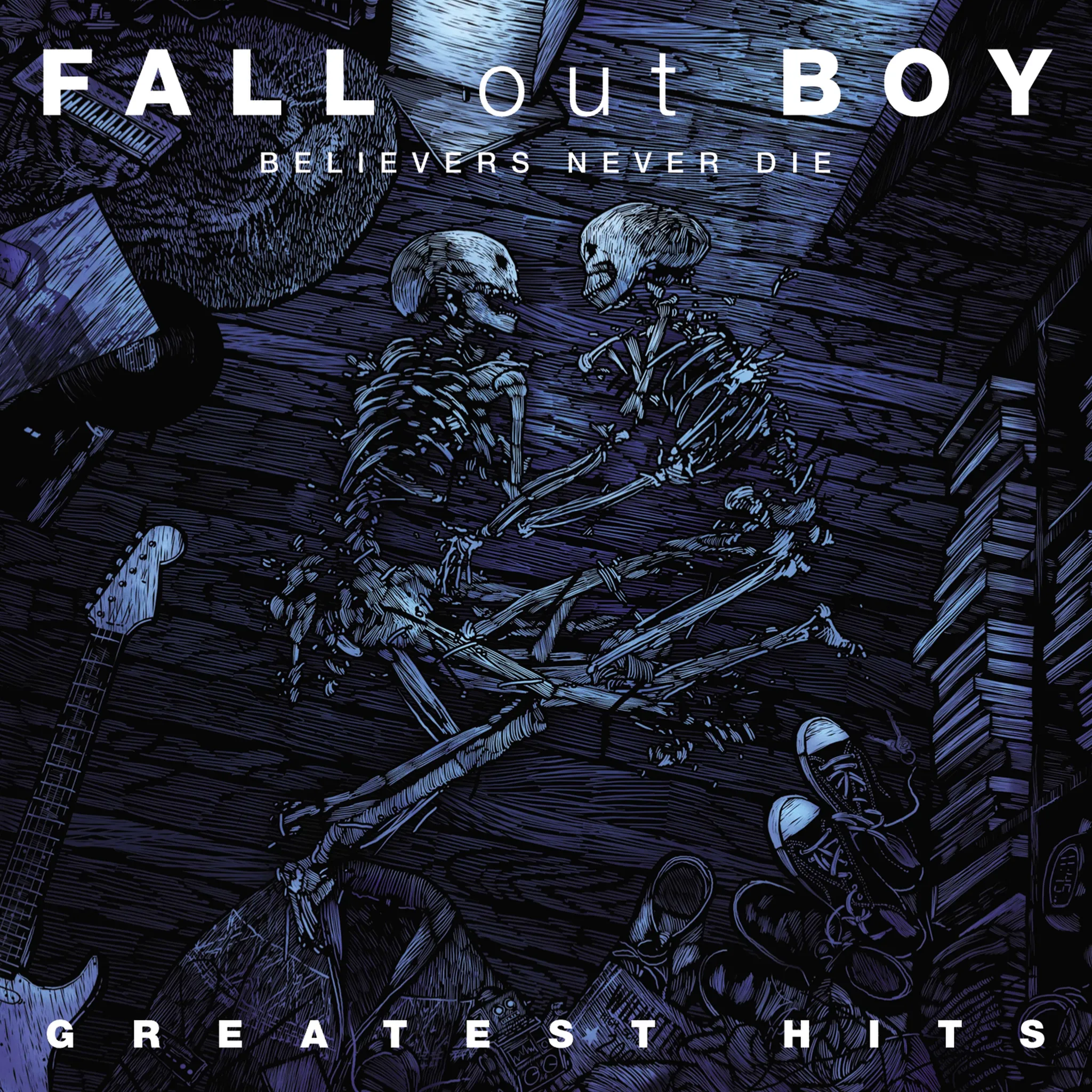The story of Fall Out Boy has, at times, been a tumultuous one. Born in the early ‘00s into a Chicago hardcore scene that didn’t care, their roots lay in the heavy. Somewhere along the way though, they decided to go against the grain. The band’s story begins with half-full Knights Of Columbus halls, van accidents and suicidal overdoses, before a breakthrough that saw them pinned as the poster boys of a genre that would soon be ostracised and ridiculed.
They were the kings of Livejournal, the ministers of MySpace, and soon, a real contender for the rulers of MTV. There were ‘those’ leaked photos, ‘that’ Hollywood marriage and a four-piece that were almost always celebrated as a duo; a singer who refused to be a frontman, a bassist who did so on his behalf, and the other two.
Nevertheless, the band became a well-oiled fighting machine. Climbing the ranks, they tossed their hat into the chart ring and came out winning. Both their second and third albums were certified platinum, whilst the latter, 2007’s ‘Infinity On High’ sat pretty at the top of the US Billboard charts. They sold out shows around the world, including a stint at The O2 in London, and even broke world records in the process. Despite the hurdles, theirs was a true tale of the underdog done good.
The wheels had to come off eventually.
“If you had seen us around that time…” guitarist Joe Trohman offers. It’s quite evident that when the curtain finally closed on the four-piece back in 2009, it had been a long time coming. After the release of Fall Out Boy’s fourth album ‘Folie A Deux’ came a backlash from fans and foes alike. It took little more than a year for the band to run out of steam and declare themselves on hiatus. “I think we were burnt out,” elaborates drummer Andy Hurley. “At times it felt like it was the end, but we talked about it as being a much needed break to explore other things and hopefully figure things out. To get back to it in a couple of years.” “Patrick and I both talked a lot, for probably a month prior,” adds Joe. “Kinda like, ‘Do you wanna stop doing this? Because I want to stop doing this.’ Patrick had wanted to work on his solo record for a long time…”
The conversation moves to Patrick Stump, sat opposite his bandmate, hat perched on head and thick black glasses framing his face. “In between every record, I’d be like, ‘You know, I think I might put out some solo thing,’” he concedes, “And it’d always be like, ‘Ahhhh, now’s not a good time, you shouldn’t do that.’ It just became one of those things that got put off and put off. That was kinda frustrating, because I wasn’t really planning on doing anything serious. But of course, by the time I got the opportunity to, I just wanted to take some time to go record a record by myself.”
In contrast, Joe was beginning to feel like an outcast within the group. Having met a musical hero, he already had an offer to embark on a new project. “I was not getting to do enough creative things within the band,” he explains. “It was so frustrating. Not to put anyone down, but I think things just got put in a place and I felt a little pushed out. So, I get to go and do this band with fucking Scott Ian [Anthrax, Stormtroopers Of Death] and he likes my songs and wants to make this record! I was like, ‘Sorry guys, I’m miserable and I don’t want to bury Fall Out Boy into the ground because it’s important, but I’m going to go do this. I have to go.’ It actually did feel like, at the time, I had so many things creatively in my head that it physically hurt not to put them somewhere.”
‘Some of the magic had worn off.’
One thing quickly becomes clear from speaking to the band. Despite their unanimous exhaustion, the hiatus was regarded in different lights by each member. For Pete Wentz, the decision seemed to take the hardest toll. “I have a hard time sometimes putting a filter on. I see things as all in, or all out,” he begins. “Sometimes I felt like that [the hiatus] was it, you know?
“When you first do something - like you play a show and the crowd sings along, or the first time your video is on MTV, or the first time you get a plaque - it’s all really special. But when you start doing special things every day, it becomes mundane. When your band determines a shareholder’s quarterly, no one wants you to focus on reality. Nobody expects you to man up. Everyone just wants to keep it going. I felt like I was a cog in the machine. When we took the break, it was by far the best thing for the band, and the best thing for me, personally. That’s when you should walk away. I just don’t think I was ready to acknowledge it at the time. Some of the magic had worn off. We’d been doing the trick for so long.”
Part of the problem was, not everyone in the band believed that they could continue turning those tricks. With their third album becoming an instant success and scoring them their first ever US Number 1, Stump already had doubts that they could emulate the same with the follow up. Before recording even began for their fourth studio effort, a little over a year after the release of ‘Infinity On High’, the singer was trying to persuade those around him to be realistic.
“I said to a lot of people, ‘We have done really great. We’ve done a lot of hard work. Careers ebb and flow; I think it would be unreasonable to expect our next record to be a hit. You don’t get struck by lightning three times. We’ll probably have a little bit of a dip. We should just create something that’s artistic and fun and just go and tour, whatever.’ With ‘Infinity’, we had done so many interviews and photoshoots. Every day would be work, work, work. So I thought that going into that record, we should maybe consider that.
“There was a feeling of, ‘No, no, you have to work even harder.’ I said, ‘Okay, I don’t know that the cross-benefit ratio is going to be what you expect it to be.’ I was alone on this; there were a lot of people - it wasn’t just suits or whatever - that we really respected saying this. So I was like, ‘OK, but when that doesn’t work, when the record is not Number 1 and it doesn’t go platinum, and all of these things that we expect to happen don’t happen, we’re gonna take a break.’ That was not an idle threat, so sure enough, when the opportunity came…”
Just as Patrick had predicted, ‘Folie à Deux’ barely bothered the charts. Landing a reasonable position at Number 8 in the US, it barely scraped the Top 40 in the UK, and neither country certified it platinum. It was about more than chart positioning though: this album stood as their most unsupported, and some were unwilling to let it go quietly.
“Every time someone mentions ‘Folie à Deux’, I see this one kid,” Patrick remembers. “We were in Chicago opening for Blink 182, and there were about twenty kids right up front who knew all the words. Every time we played an older song, they sang along with every word, and every time we played anything newer, they would get angry. There was this one moment where Pete goes, ‘So, we’re gonna play a new song’ and this one kid is looking right at me, just flicking me off. He had this look on his face that was so angry.”
It wasn’t the only example. Both Patrick and Joe recount tales of crowd members all over the world throwing their middle fingers in the air at the band whenever a song from their fourth album was played. “That was draining,” he continues. “The first time there’s that kid, I’m like, ‘Yeah, OK, whatever. I get it.’ The second time there’s that kid, you’re like, ‘Wanna know what? We’re happy. The four of us, we meant this and we’re proud of it.’ But, by the hundredth time, I just take it home. I don’t know how to shut it off. I want everyone to be happy, I want everyone to feel good, I don’t really want bad things to happen. I’m a wuss like that. The look on that guy’s face is just so haunting. Any time anyone says the name ‘Folie à Deux’, I remember that.”
20th November 2009: Fall Out Boy officially announce their indefinite hiatus. The four set off in entirely different directions. Patrick began to work on his soul-infused solo project, whilst Joe and Scott Ian began The Damned Things with Rob Caggiono (Anthrax), Keith Buckley (Every Time I Die), Josh Newton (ex-Every Time I Die), and Andy in tow. Meanwhile, Pete mixed DJing with new project Black Cards, which he felt was a refreshing change of scenery.
“It was cool because it was non-cathartic music,” he explains. “I got really into doing remixes and music that didn’t have words. It allowed me to explore a different side of myself, which felt less exposed.” “I think it was cool to explore different things, or go back to different things. Do some hardcore stuff,” adds Andy, who - even after The Damned Things - returned to his heavy roots a little more. “It was good to decompress.”
Feeling exposed was definitely still a factor for Patrick, however, who put a lot on the line for his solo career. Having released his EP ‘Truant Wave’ in February 2011, he followed it up with a full-length, ‘Soul Punk’, later that year and began to tour. Despite admitting to having the time of his life, it didn’t take long for things to start going awry. “I had spent a lot of time putting together a group of musicians, and man, I love those guys. We would go have dinner together and hang out and all of these things that bands should do, but Fall Out Boy had kind of stopped doing. It was magical. I had such a blast. I’d be up there having the time of my life, and then there’d be some kid, like this…” He raises his middle finger.
‘I wasn’t ready for it to end.’
“My manager said to me when we started, ‘You know, solo projects are greater risk and greater reward. When someone says they like it, it feels a completely different way.’ And it does. There’s something that you own about it because it’s just you. But when someone says they hate it, that’s a whole other level. I thought it was bad on ‘Folie’? It was really bad on ‘Soul Punk’. It was like standing in front of the goal for a bunch of hockey pucks and just getting pelted in the chest.”
At the other end of the spectrum, Joe’s time away seemed to go swimmingly. Whilst his band faced the obvious criticism from heavy music fans - after all, metal lovers tend to veer away from bands like Fall Out Boy - The Damned Things quickly garnered respect, and Joe finally began to stretch his legs as a songwriter. “I was surprised by the amount of positivity. I think that one of the most unfortunate things about that band was that we stopped doing it right when things were really kicking off. That was when Anthrax and Every Time I Die both wanted to do a new record.”
Joe later turned his hand to a new project, With Knives. Focussing on a DIY aesthetic, it was, as he admits, “the epitome of selfish music. That was music we wanted to make, for ourselves and whatever the fuck you think, we don’t really care because we really like it.”
Each member experienced a certain amount of success, but there was no eclipsing their former fame. With an entire lifetime of work behind them, there were inevitably dark days. “It institutionalises you in a way,” comments Andy, who recently admitted that the hiatus led him to suicidal thoughts. “That’s what you do; you’re with these people, you have this crazy schedule and then you have nothing. It’s hard to adjust. I wasn’t ready for it to end.”
Wentz, who has openly struggled with depression in the past, mirrors some of Andy’s feelings. “There were dark moments, but it wasn’t blackness. It helped me understand, and empathise with other people’s feelings. It forced me to look in the mirror and man up. I mean, I have a four-year-old kid, I felt like my life had purpose.”
“With hindsight it was totally worth it,” Andy is quick to add. “It’s made everything better for everyone.”
“There’s this notion that when you take a break from your band, you get frozen in ice, and they have to thaw you out,” jokes Pete. That’s not the case, just to clarify. “We were all people who had lives and were friends with each other. Me and Patrick would talk about stuff from time to time. We tried to write a couple of times, but it didn’t go anywhere…”
“Pete and I never stopped writing,” Patrick offers. “But there were waves of thinking, ‘Yeah this is cool… Yeah, this isn’t cool.’ Us not really digging what we were doing. At some point, I thought that I should probably look into getting a proper job or something. Right after that, I was in this place where I was just ready for fun and I didn’t really care. There were a couple of songs that Pete really liked a lot, and he goes, ‘What do you think? Do we wanna bring this to the other guys?’ I was like, ‘Maybe, but there’s a lot of things that need to change if we’re gonna come back.’
Just like that, Fall Out Boy was back on the table. Granted, some negotiations had to take place; some things had to change.
“Pretty much right away, I brought up Joe.” Patrick was adamant that both he and Andy needed larger roles in the band. With Joe having already proved his worth tenfold with both The Damned Things and With Knives, he saw no reason to waste his talent.
“At this point, the four of us have grown into a strong enough bunch of dudes that we should probably integrate that, rather than keep this - quote end quote - ‘Pete and Patrick show’ going. That was my way of saying, ‘Okay, yes, I would love to come back, but I want Joe to be more in the band, I want Andy to sing. He sings great, I don’t see why at this point we’re a four piece band with no harmonies live; that’s kinda ridiculous as Andy’s got an excellent voice. I want to practice; we were so burned out that we never did that. Just basic things…”
‘It sounds like such a happy ending, but it is.’
“We had a three hour conversation,” explains Joe. “I was the last guy that wanted to do it. It’s not that I hadn’t thought about it. When Patrick and I had our phone call, I had my list of stipulations, and he had thought so hard about it that he disarmed me by bringing up my entire list before I could. My biggest one was writing. I was like, ‘I can write. If I’m not writing in this band…’ I had this thought and he said it. ‘If you’re not writing in this band, then we should just let you go.’”
It was a thought mirrored throughout the band, as Andy interjects: “Yeah, that was great for Joe, because we did The Damned Things and he was the main songwriter for that and then he did With Knives. It was really good for him to grow as a songwriter and come back into it as a much bigger piece of that puzzle.”
Deals done, they secretly began work on their forthcoming fifth record, ‘Save Rock And Roll’; an album already markedly different thanks to the changes in their dynamic. “For all intents and purposes we were a new band in the studio. People had different roles. It was an interesting process,” explains Pete. “I think the part that was really important was that we’re making a skeletal album. There’s not gonna be any fat. In the past, it’s always like, ‘Oh, this is one dude’s favourite song. I’m sure we’re never gonna play it, but we’ll put it on.’ It was a democratic process, but here, it was even more so. Now it’s like a representative democracy. If it’s not unanimous, it’s not on the album.”
With their new politics comes a rejuvenated respect for one another. Whilst some listeners might crave the band of old, their four year break has changed them in ways they might have never imagined possible. “I don’t want to lose Fall Out Boy,” states Joe. “I want to keep the essence of Fall Out Boy - I think we all do - but changes needed to be made for us to come back healthily and be happy about what we were making. Every day is positive. It sounds like such a happy ending, but it is.
“A lot of people will ask, ‘Is it like it used to be? Is it like the old days?’ Fuck no! We fought like crazy in the old days!” laughs Stump, before Trohman pipes up: “In the old days I quit the band for two months once! We were all young, we were growing up, not being able to live in the moment and with ridiculously bad coping skills. We were completely emotionally immature.
“While I can blame people within the band, or certain people, for making me feel pushed out, I can blame myself as well for not knowing how to assert myself, not having the skills. Now, growing up and going off and doing our own things in order to develop, I can objectively hear something, and go, ‘Maybe that’s not my thing, but I get why it’s a better thing.’”
“We get to have our way. We have our places to do exactly our own thing,” offers Patrick. “This is our thing.” Joe is almost eager to continue his sentence, but Patrick stops him: “I think we should just end on that. It’s great. This is our thing.” Across the table, Stump offers his hand, and they shake in agreement, laughing at one another. Fall Out Boy may have had a tempestuous story up until now, but this is a whole new chapter.
Fall Out Boy’s new album ‘Save Rock And Roll’ will be released on 15th April via Decaydance. Find a behind-the-scenes gallery from their photo shoot in the 25th March edition of DIY Weekly, available from Apple Newsstand.
Taken from the April 2013 issue of DIY, available now. For more details click here.
Read More

Download adds Frank Carter & The Rattlesnakes, Enter Shikari, Tom Morello and more to 2024 lineup
They join already announced acts like Queens of the Stone Age, Fall Out Boy, and Royal Blood.
30th January 2024, 1:42pm

Fall Out Boy - So Much (For) Stardust
4-5 Stars
A real joy.
24th March 2023, 12:00am

Core Strength: Fall Out Boy
After five years away, Fall Out Boy are going back to their roots with ‘So Much (For) Stardust’: an album that embraces their origins with the older, wiser heads of seasoned pros.
6th March 2023, 8:13pm

Fall Out Boy announce 2023 UK/EU tour
PVRIS and Nothing, Nowhere will be coming along for the ride too.
8th February 2023, 12:00am
